
As part of the celebration of the three-year long restoration of the Theatre Royal de Liege (and, from what we can see in this DVD
it is a glorious restoration indeed), the Opera Royal de Wallonie went all the way to find as Belgian an operatic experience as was possible. The company came up with Stradella, a three-act opera composed by Liege-born Cesar Franck when he was a teenager in the early 1840’s and unseen since then until this production in September 2012.
Franck’s opera was found complete with only a piano score and some “hints at orchestration.” The company employed composer Luc van Hove to develop the orchestration, and thus was ready to perform the fully orchestrated Stradella for the very first time.
Neither the libretto by Emile Deschamps and Emilien Pacini nor the sketchy melodrama of the plot suggests a work of much depth or complexity.
In the structured three-act form, we find the Duke of Pesaro and his henchman Spadoni preparing to kidnap the lovely orphan Leonor during Carnival in Venice. The well-known singer Stradella arrives and we find that he and Leonor are in love. The Duke’s men kidnap Leonor and she is thrown into the basement of his palace. In a major stretch of the willing suspension of disbelief, the Duke hires Stradella himself to serenade the woman and win her for him. Stradella and Leonor escape after a brief skirmish with the Duke.
In the final act, Stradella has taken refuge in Rome and is preparing to sing for Holy Thursday. Leonor arrives (they have apparently separated in their escape), sings an aria of terror for Stradella’s fate, and (in this version) promptly dies. In the original, the killers hired by Spandini to do Stradella in are moved by his singing and decide to spare him. In the end, the Duke forgives the lovers and blesses their union.
But not here. Stage director Jaco Van Dormael has opted for a tragic ending (though he changes none of the music) where Leonor dies and Stradella is murdered. The Duke still forgives them, and they are reunited and sing of their posthumous love. The opera ends on a positive note with the Duke and chorus praising the two lovers who are reunited in Heaven.
Van Dormael and his designers have created an extravagant, visually striking and fantastical production to lead us into Franck’s romanticism. There is remarkable work from set designer Vincent Lemaire, costume designer Olivier Beriot, and lighting designer Nicholas Olivier. Van Dormael’s fascinating if occasionally befuddling staging choices include setting the entire piece with the singers wading, from ankle to waist deep, in water (sources say 45,000 litres were used in the production).
At first, I thought this was a nod to the canals of Venice, but in the third act, the water was in Rome, too! There are two inundating rainstorms to add to the wet goings-on. All the action takes place either in the water or balancing on thin piers just above it. While this led to some beautiful images (Leonor in her Bjork-like dress appeared to glide along the water like a swan), it also caused much of the movement to be slow-motion as the singers slogged soggily across the stage.
There were other lovely touches in the romantic design as well, including a singing man-in-the-moon and a fish that floated above the audience. Large bubbles were frequently blown surrounding the characters (another bit of light hearted romanticism?). Rather than a crown, the Duke was fitted with a huge bag of helium balloons over his head, rather like the “caption bubble” over a cartoon character.
I couldn’t help having the feeling that the beautiful visuals were an attempt to hide the slightness of the musical experience of Stradella. While the score is full of ardent youthful passion and a buoyant romantic feel, the music has little complexity and produces no moments of serious emotion. The chorus writing, in particular, is very weak, simplistic and repetitive. Franck is at his best in the Act One and Two love duets for Stradella and Leonor, quite powerful and moving, lush with romantic ardor. There is only a struggle between the power of love and the amoral evil of the villains, no shades of grey or moral ambiguity to be found.
The singing is competent but mostly undistinguished. Belgian singers play the leads—tenor Marc Laho as Stradella and soprano Isabelle Kabatu as Leonor. Laho’s tonal beauty and delicacy of phrasing makes him a standout in this production. He is stentorian in his passions, yet finds subtle shadings in his duets with Leonor.
Ms. Kabatu certainly has her moments. She has gleaming top notes, where one can hear an Aida voice, one of her signature roles. But the voice becomes thick and cloudy in the middle and she just can’t produce the requisite volume in the lower voice. She also seems to have difficulty navigating her rich soprano in quicker passages; she seems much more comfortable in the more legato moments.
Unfortunately, the lower voices are gruff and grainy. Neither Phillippe Rouillon as the Duke nor Werner Van Mechelson as Spandini bring much in the way of characterization or distinguished singing to the proceedings, coming off as cardboard villains without much voice to compensate.
Conductor Paolo Arrivabeni can be credited with keeping the score afloat and propulsive during the passionate duets, but the choral passages were dull and turgid, like the air coming out of one of the set’s bubbles and balloons. Arrivabeni’s conducting style is quiet and devoid of any obvious passion for the score, and he frankly looks bored much of the time.
I have to wonder if Stradella as an opera was really worth all the elaborate trappings of this production. While it is a score that is fairly astonishing for a fifteen-year-old composer, it seems no more than a journeyman effort on the way to Franck’s mature work for organ or his great “Panis Angelicus.” I’d actually like to hear Stradella again in a simple, possibly even a workshop, production, where the singing and the music could be front and center.














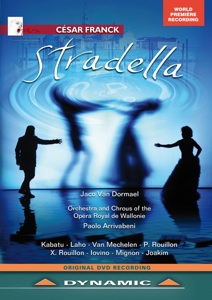
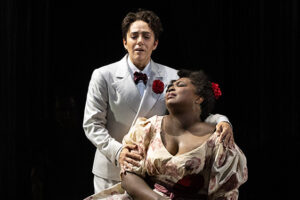
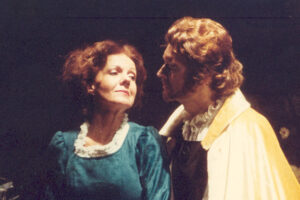
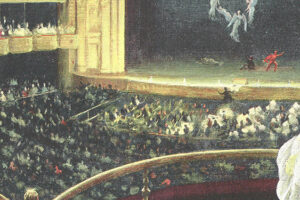
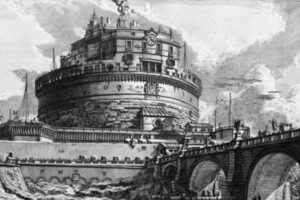






Comments